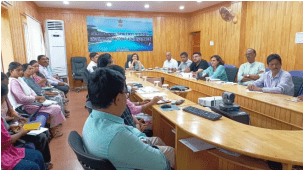The Andaman and Nicobar Islands have reaffirmed their commitment to building a drug-free society with the first state-level committee meeting of the Nasha Mukt Bharat Abhiyaan (NMBA) held at the Secretariat in Sri Vijaya Puram. Chaired by the Commissioner-cum-Secretary of Social Welfare, the meeting brought together key officials from multiple departments, NGOs, and community stakeholders to frame strategies for awareness, prevention, and rehabilitation. The participation of representatives from the State Level Coordinating Agency in Tamil Nadu through video conferencing added an inter-state dimension to the discussions.
The meeting reflected growing recognition that substance abuse, though not always visible, remains a pressing concern that can impact the social fabric of the islands. The presence of officers from police, health, education, prohibition, and social welfare departments underlined the importance of a coordinated approach. Retired civil servants and NGOs also joined the deliberations, highlighting how community engagement and institutional experience can work together to shape responses.
Key issues discussed included awareness campaigns targeting youth, preventive education in schools and colleges, and rehabilitation services for individuals already affected by substance abuse. The Commissioner-cum-Secretary emphasized that no single department could address the challenge alone, and only collective efforts would yield results. The focus was on making NMBA not just a government programme but a community-driven initiative that engages families, teachers, social workers, and youth leaders.
The discussion also covered the importance of integrating preventive messages with broader social programmes so that awareness does not remain a one-time event but becomes part of everyday life. Linking campaigns with health drives, school activities, and cultural events was suggested as a way to normalize conversations around substance abuse and reduce stigma for those seeking help. Rehabilitation was also given priority, with calls for expanding counselling services, treatment facilities, and after-care programmes to ensure recovery pathways remain open and accessible.
Coordination between departments was a recurring theme, with participants agreeing that effective implementation requires information sharing and regular monitoring. By aligning the work of police, health workers, educators, and community groups, the administration aims to create a safety net that prevents vulnerable individuals from slipping into addiction. The meeting concluded with a commitment from all stakeholders to extend full cooperation in carrying forward NMBA activities across the islands.
The focus on NMBA comes at a time when the Andaman and Nicobar Islands, like many regions, are grappling with the dual challenges of youth engagement and community health. As a geographically isolated region, the islands face unique risks of illicit supply chains and limited access to rehabilitation resources. The administration’s push through NMBA therefore seeks to combine prevention with resilience, building stronger community structures that can resist the spread of substance abuse.
While NMBA is a national programme, the first state-level committee meeting in the islands gave it a distinctly local context. By involving NGOs, tribal representatives, and social workers alongside government officials, the discussion highlighted how drug prevention cannot succeed without grassroots involvement. The inclusion of civil society voices underscored the understanding that long-term change requires not just enforcement but also empathy, education, and inclusion.
With the conclusion of the meeting, the roadmap for NMBA in the islands has begun to take shape. Awareness campaigns, rehabilitation initiatives, and inter-departmental collaboration will now need to translate into sustained action on the ground. For the Andaman and Nicobar Islands, the meeting marked an important step in aligning national priorities with local realities and reaffirmed the collective resolve to make the archipelago a model of resilience in the fight against substance abuse.





